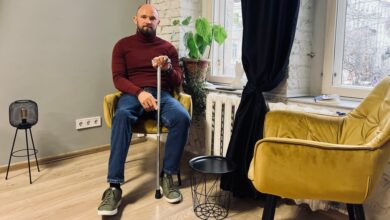They fled the war in northeastern Nigeria. Bulldozers then leveled their homes in a camp in Abuja
ABUJA, Nigeria (AP) — On a blustery morning at the height of the dry season six months ago, Rifkatu Andruwus and her children sat chatting outside their home in a displaced persons camp in the heart of Nigeria’s capital. Suddenly, security forces stormed into the camp, closely followed by bulldozers.
The family of seven had about half an hour to pack up and leave before their slum and about 200 others were reduced to rubble.
“They sent people to tell us to pack,” says 66-year-old Andruwus. “Then they started demolition.”
The Durumi camp for displaced persons in Abuja, Nigeria’s capital, has been home to Andruwus since her family fled fighting between Nigerian security forces and Islamist extremists in the country’s northeast a decade ago.
She arrived here after narrowly escaping death herself, but one of her sons and a grandson were killed in an attack by the extremists in the town of Gwoza in the northeastern state of Borno.
Islamic extremist rebels launched an uprising there in 2009 to fight against Western education and to establish Islamic law, or Sharia, in the region. At least 35,000 people have been killed and more than 2 million displaced as a result of the militant’s violence Boko Haram group and a breakaway faction backed by the Islamic State group, according to UN agencies.
Since the demolition of Durumi in December, Andruwus and hundreds of others who had lived in the camp have been forced to spend their nights outside and in the rain – without compensation or alternative shelter from the authorities.
Slums and slums are often targets of rampant destruction in Africa’s most populous country, and especially in Abuja. The government has defended the actions as a continued effort to reinstate the city’s master plan – a conceptual layout intended to promote growth in this oil-rich West African country.
But the latest demolition has displaced some of the city’s most vulnerable people, exacerbating the housing crisis due to high rents and growing demand, activists say.
The situation has led activists to put pressure on the authorities to provide alternative shelters or at least compensation to the homeless, many of whom are among the country’s poorest.
Nearly two-thirds of Nigerians live in poverty and so does the country is experiencing record unemployment. According to the World Bank, as many as 46% of the country’s more than 200 million inhabitants do not have access to electricity.
So far, the activists’ efforts have met with little success, largely thanks to the help of philanthropists. Abuja authorities have insisted that the demolition of the Durumi camp was legal and carried out for security reasons.
Amnesty International says the city’s forced evictions are illegal – often without notice or alternative shelter for those whose homes have been demolished.
“Much of the destruction in and around Abuja is just an attempt to take (and give) land from the poor to the rich,” said Isa Sanusi, Amnesty’s acting director for Nigeria.
He said Nigerian authorities often use the issue of illegal drugs and insecurity as an excuse for the deportations.
“The lack of shelter for victims of the forced evictions only shows that no resettlement plans or compensation were made prior to the forced evictions,” Sanusi added.
For many years, the Durumi camp has been a refuge and hope for those fleeing extremist violence and seeking to rebuild their lives in Abuja. But authorities claimed it was a hideout for criminals.
Although it housed more than 2,000 displaced people, the makeshift camp had not received any help from the government in recent years and survived only on food and medicine donated by aid groups and well-wishers, said Ibrahim Ahmadu, who serves as camp chairman and is now helping to mobilize resources for the homeless.
Many of the families that once lived in Durumi now roam the streets homeless, while the youth are further exposed to social problems such as drug abuse, violence and crime, Gabriel Ogwuche said. His group, the Society for the Youth and the Downtrodden, is fighting against the destruction.
Like many other households, Andruwus’s family managed to survive in the camp on what they earned from menial jobs, as farm laborers or from petty trade. But without a roof over their heads, survival has become increasingly difficult.
Many former camp residents have found shelter under the trees in Durumi and under overpasses that criss-cross the streets of Abuja. The lucky ones have mosquito nets that they received from aid organizations or charities.
Some others have decided to return to their villages in Borno, despite the ongoing fighting there.
“We lived more than this (but) it was Boko Haram that drove us out of our homes and brought us here,” says 18-year-old Ibrahim Zakaria, whose family also lost their home in the Durumi demolition.
“Now we are seeking help from the government and no help is coming,” he added.




